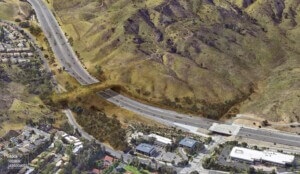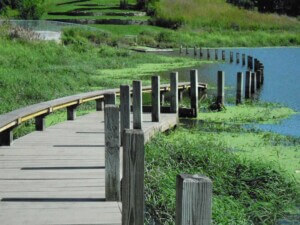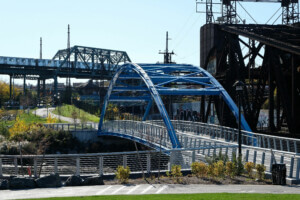When 121-year-old timberland and forest products company Weyerhaeuser decamped from its longtime corporate home in Federal Way, Washington, for more modest digs at Pioneer Square in downtown Seattle in 2016, the preservation alarm bells went off almost immediately—and haven’t stopped, only growing louder with time.
Now, as the threat to the former Weyerhaeuser campus becomes increasingly dire, an international letter-writing campaign headed by Washington, D.C.-based nonprofit The Cultural Landscape Foundation (TCLF) has launched that aims to halt what has been deemed as “inappropriate” development at a famously sylvan site that landscape architect Laurie Olin, founding principal of OLIN, has called “a treasure of modern architecture, site planning, community benefit and environmental leadership.”
Opened in 1972 on company-owned timberland just north of Tacoma, the Weyerhaeuser complex in Federal Way is unlike any other corporate campus in the United States. For one, it’s positively massive. Sprawling across 425 acres just east of Interstate 5, the campus has been likened as a sort of super-sized, arboriculture-focused Disneyland complete with bonsai and rhododendron gardens, trails, water features including a large pond, and a meadow where, as recounted by KUOW, the company would land a Santa Claus-commandeered helicopter every Christmas. Even more than its size, the peerless campus—designed by landscape architect Peter Walker, founding principal of Sasaki, Walker and Associates (SWA) and architect Edward Charles Bassett, partner at Skidmore, Owings & Merrill (SOM)—is famed for the manner in which it is seamlessly integrated into the lush Pacific Northwest landscape with its terraced, ivy-shrouded main administrative building emerging from the meadow in an enigmatic, almost otherworldly fashion.

In early 2016, the Seattle-bound Weyerhaeuser sold its Federal Way campus to Los Angeles-headquartered Industrial Realty Group (IRG) for $70 million and, as mentioned, the property gained almost instantaneous imperiled status, though it remained unclear at the time what exactly IRG had in mind regarding future development. That same year, TCLF listed the Weyerhaeuser campus on its Landslide report of endangered landscapes. In more recent years, the threat to the Weyerhaeuser campus has become all the more clear—and urgent—with the revelation that IRG plans to build over 1.5 million square feet of warehouse space across 132 largely forested acres. While IRG’s redevelopment scheme wouldn’t wholly decimate the site and SOM’s landmark modernist building would remain undisturbed, it does ignore a mid-1970s master plan that specifies appropriate areas of the campus for future development that would be minimally disruptive. Per TCLF, IRG has also turned away offers of design assistance from Walker, SOM partner Craig Hartman, and SWA managing principal René Bihan.
Along with TCLF, the local grassroots group, Save Weyerhaeuser Campus, has also been instrumental in highlighting the architectural and environmental significance of the site and why any future development must be carried out with utmost sensitivity.
TCLF’s letter-writing campaign is geared to help raise continued awareness of the threat that the Weyerhaeuser campus is facing under IRG ownership and to put pressure on both Federal Way Mayor Jim Ferrell and Colonel Alexander Bullock, Seattle district commander with the U.S. Army Corps of Engineers, to consider the disruptive nature of IRG’s plans. The letters, which have so far come from a slew of prominent landscape architects and architects as well as design leaders, historians, and scholars, are jointly addressed to Ferrell—the City of Federal Way, under his leadership, is responsible for issuing land use and construction permits—and to Bullock because the Army Corps is currently reviewing how the site’s wetlands will be impacted by the planned development.
The letters, which can be viewed on a special Weyerhaeuser Letters micro-site launched by TCLF, stress the vast significance of the Weyerhaeuser campus.
In his letter, Richard Longstreth, professor emeritus at George Washington University, notes that the Weyerhaeuser campus “merits National Historic Landmark status;” Thaisa Way, program director of landscape and garden studies at Dumbarton Oaks in Washington, D.C., and professor, Landscape Architecture Department, at the University of Washington’s College of Built Environments refers to the Federal Way site as “an international icon of Modernism;” Marc Treib, professor emeritus of architecture at the University of California, Berkeley regards Weyerhaeuser in his letter as “the best preserved and most outstanding corporate campus in the United States, arguably in the world,” and Gwendolyn Wright, professor emerita, Graduate School of Architecture, Planning and Preservation, Columbia University, similarly states: “I consider it the most significant corporate campus in the world.”

As for Walker, an excerpt of his letter addressed to Ferrell and Bullock reads: “In my 60 years of landscape architecture projects, which include the Nasher Sculpture Center in Dallas, the National September 11 Memorial with Michael Arad in New York City, and the U.S. Embassy in Beijing, Weyerhaeuser Headquarters is perhaps the most important and certainly the dearest to my heart.”
Joining the above in the campaign are David Streatfield, professor emeritus of Landscape Architecture and Urban Design and Planning at the University of Washington; design critic and architectural historian Alexandra Lange, Todd Grover and Liz Waytkus of Docomomo US, landscape architects Bill Johnson, Gary Hilderbrand, Debra Guenther, and Brice Maryman, and others.
All of the letters—18 of them written to date with surely more to come—can be viewed in full here. TCLF has also provided contact information for those interesting in reaching out to Ferrell and Bullock and making their own voices heard.











